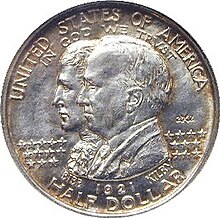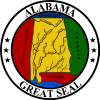Portal:Alabama
The Alabama Portal Alabama (/ˌæləˈbæmə/ AL-ə-BAM-ə) is a state in the Southeastern region of the United States. It borders Tennessee to the north, Georgia to the east, Florida and the Gulf of Mexico to the south, and Mississippi to the west. Alabama is the 30th largest by area and the 24th-most populous of the 50 U.S. states. Alabama is nicknamed the Yellowhammer State, after the state bird. Alabama is also known as the "Heart of Dixie" and the "Cotton State". The state has diverse geography, with the north dominated by the mountainous Tennessee Valley and the south by Mobile Bay, a historically significant port. Alabama's capital is Montgomery, and its largest city by population and area is Huntsville. Its oldest city is Mobile, founded by French colonists (Alabama Creoles) in 1702 as the capital of French Louisiana. Greater Birmingham is Alabama's largest metropolitan area and its economic center. Politically, as part of the Deep South, Alabama is predominantly a conservative state, and is known for its Southern culture. Within Alabama, American football, particularly at the college level, plays a major part of the state's culture. Originally home to many native tribes, present-day Alabama was a Spanish territory beginning in the sixteenth century until the French acquired it in the early eighteenth century. The British won the territory in 1763 until losing it in the American Revolutionary War. Spain held Mobile as part of Spanish West Florida until 1813. In December 1819, Alabama was recognized as a state. During the antebellum period, Alabama was a major producer of cotton, and widely used African American slave labor. In 1861, the state seceded from the United States to become part of the Confederate States of America, with Montgomery acting as its first capital, and rejoined the Union in 1868. Following the American Civil War, Alabama would suffer decades of economic hardship, in part due to agriculture and a few cash crops being the main driver of the state's economy. Similar to other former slave states, Alabamian legislators employed Jim Crow laws from the late 19th century up until the 1960s. High-profile events such as the Selma to Montgomery march made the state a major focal point of the civil rights movement in the 1950s and 1960s. (Full article...) Entries here consist of Good and Featured articles, which meet a core set of high editorial standards.
 The Alabama Centennial half dollar, or Alabama half dollar, was a commemorative fifty-cent coin struck by the United States Bureau of the Mint in 1921 as a belated acknowledgement of the 100th anniversary of Alabama's admission to the Union in 1819. The coin was created by Laura Gardin Fraser, the first woman credited with designing a coin. Alabama Congressman Lilius Bratton Rainey introduced legislation for a commemorative coin at the request of the state's centennial commission. The bill originally provided for commemorative quarters but was amended to provide for halves instead. The bill moved quickly through the legislative process and became the Act of May 10, 1920, with the signature of President Woodrow Wilson. (Full article...)Selected article - Birmingham (/ˈbɜːrmɪŋhæm/ BUR-ming-ham) is a city in the north central region of Alabama. Birmingham is the county seat of Jefferson County, Alabama's most populous county. As of the 2022 census estimates, Birmingham had a population of 196,910, down 2% from the 2020 census, making it Alabama's third-most populous city after Huntsville and Montgomery. The broader Birmingham metropolitan area had a 2020 population of 1,115,289, and is the largest metropolitan area in Alabama as well as the 50th-most populous in the United States. Birmingham serves as an important regional hub and is associated with the Deep South, Piedmont, and Appalachian regions of the nation. Birmingham was founded in 1871, during the post–Civil War Reconstruction period, through the merger of three pre-existing farm towns, notably, Elyton. It grew from there, annexing many more of its smaller neighbors, into an industrial and railroad transportation center with a focus on mining, the iron and steel industry, and railroading. Birmingham was named after Birmingham, England, one of the UK's major industrial cities. Most of the original settlers who founded Birmingham were of English ancestry. The city may have been planned as a place where cheap, non-unionized, and often African-American labor from rural Alabama could be employed in the city's steel mills and blast furnaces, giving it a competitive advantage over industrial cities in the Midwest and Northeast. (Full article...)General images -The following are images from various Alabama-related articles on Wikipedia.
Did you know -
TopicsCategoriesNew articlesThis list was generated from these rules. Questions and feedback are always welcome! The search is being run daily with the most recent ~14 days of results. Note: Some articles may not be relevant to this project.
Rules | Match log | Results page (for watching) | Last updated: 2024-05-27 19:33 (UTC) Note: The list display can now be customized by each user. See List display personalization for details.
Related portalsWikiProjectsAssociated WikimediaThe following Wikimedia Foundation sister projects provide more on this subject:
Sources |
- Manually maintained portals without listed maintainers
- Manually maintained portal pages from August 2021
- All manually maintained portal pages
- Single-page portals
- All portals
- Portals with no named maintainer
- United States portals by state or territory
- WikiProject Alabama
- Alabama
- Portals needing placement of incoming links

































































